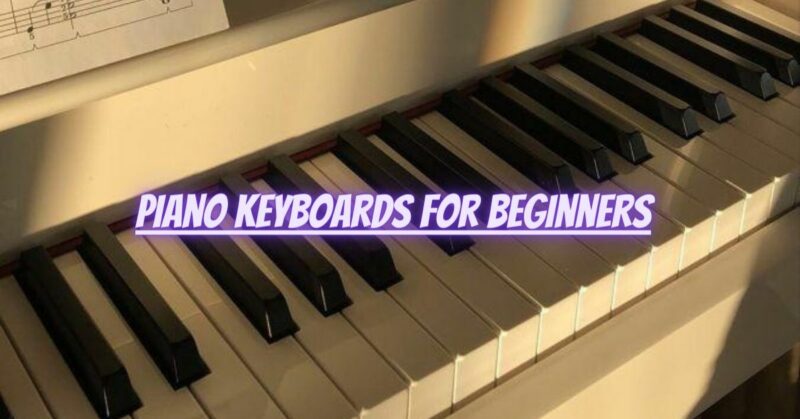Learning to play the piano is a rewarding and fulfilling journey, and having the right instrument is crucial, especially for beginners. For those just starting, a piano keyboard can be an excellent choice due to its versatility, portability, and affordability. However, with so many options available in the market, choosing the right piano keyboard can be overwhelming. This article aims to guide beginners through the process of selecting the perfect piano keyboard that suits their needs and aspirations.
**1. ** Types of Piano Keyboards:
Before diving into the selection process, it’s essential to understand the various types of piano keyboards available. The two main types are:
a. Digital Keyboards: Digital keyboards are electronic instruments that replicate the sound of a traditional piano using digital samples. They come in various sizes and offer a wide range of features, including different instrument sounds, recording capabilities, built-in rhythms, and connectivity options. These keyboards are typically lightweight and portable, making them ideal for beginners and those with limited space.
b. Synthesizers: Synthesizers, like digital keyboards, are also electronic instruments. However, they focus more on producing and manipulating a wide range of sounds and often include additional features like programmable sound patches and extensive controls for sound shaping. While synthesizers can be a fantastic option for creative experimentation, they might not be the best choice for beginners solely interested in learning the piano.
**2. ** Number of Keys:
Piano keyboards come in various sizes, typically ranging from 25 to 88 keys. For beginners, it’s recommended to start with a full-sized keyboard, which has 88 keys, as it allows them to access the entire piano’s range. Keyboards with fewer keys are usually more compact and may be suitable for young children or those with specific space constraints, but they have limitations when it comes to playing certain pieces.
**3. ** Weighted vs. Non-Weighted Keys:
Weighted keys simulate the feel of an acoustic piano by providing resistance when pressed, similar to the touch of traditional piano keys. On the other hand, non-weighted keys are lighter and easier to press, making them more suitable for synthesizer-style playing and beginners who may find the resistance of weighted keys challenging. While both options have their merits, choosing weighted keys can provide a smoother transition to playing on acoustic pianos in the future.
**4. ** Touch Sensitivity:
Many digital keyboards come with touch-sensitive keys, which means that the sound’s volume changes based on how hard or soft the keys are pressed. This feature adds expressiveness to your playing and helps develop dynamic control. For beginners, touch-sensitive keys are highly recommended, as they contribute to the development of essential playing skills.
**5. ** Built-in Learning Features:
Some digital keyboards come equipped with built-in learning features, such as lesson modes, interactive tutorials, and even light-up keys that guide beginners through songs. These features can be incredibly beneficial for those starting their musical journey, as they provide structured learning and help build a solid foundation.
**6. ** Connectivity and Compatibility:
Check the keyboard’s connectivity options to ensure it suits your needs. USB ports allow you to connect your keyboard to a computer or other devices for recording, music software integration, and MIDI capabilities. Additionally, some keyboards come with audio outputs and headphone jacks for private practice sessions.
**7. ** Budget Considerations:
As a beginner, it’s not necessary to invest in an expensive high-end keyboard. There are plenty of affordable options that offer excellent features for learning and practicing. Set a budget that aligns with your commitment to learning and your long-term musical goals.
**8. ** Brands and Reviews:
Research various piano keyboard brands and read reviews from other beginners or experts. Brands like Yamaha, Casio, Korg, Roland, and Kawai are known for producing quality digital keyboards suitable for beginners.
Conclusion:
Selecting the right piano keyboard is a critical decision for any beginner. Consider your musical goals, available space, budget, and desired features when making your choice. Remember that learning the piano is a journey that requires dedication and practice, so choose a keyboard that motivates and supports you throughout this fulfilling endeavor. With the right instrument and determination, you’ll soon find yourself making beautiful music on your piano keyboard. Happy playing!


